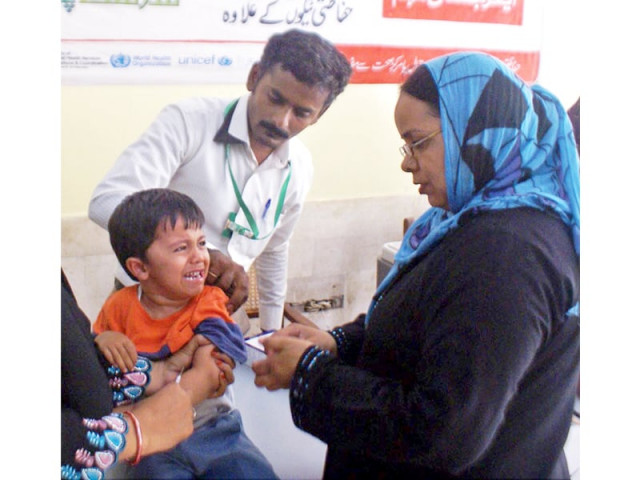Anti-measles campaign: Doctors unsure of success as power outages continue to mar efforts
13-day campaign is a joint venture of Sindh govt and the WHO and will cost Rs1,050m.

The 13-day immunisation campaign against the measles virus starts today. PHOTO: ONLINE
Sindh Chief Minister Syed Qaim Ali Shah inaugurated the 13-day 'special immunisation campaign' against the measles virus by administering the vaccine to a child at Chief Minister House on Monday.
Health experts, however, remained skeptical about the campaign's success as they believe the prolonged load-shedding will adversely affect the efficacy of the vaccines.
The provincial health secretary, Iqbal Durrani, briefing the chief minister, said that the campaign was being conducted in collaboration with the World Health Organisation (WHO), with a total joint investment of Rs1,050 million. "Over Rs800 million will be spent on the procurement of vaccines, while Rs250 million will be allocated for the operational activities throughout the province," he said.
Durrani said that approximately 13.3 million children, between the ages of six months to 10 years, will be immunised with the help of 6,959 skilled workers and 130,181 social mobilisers. The campaign will be carried out in 1,120 union councils of 29 districts in the province.
He said that the social mobilisers have been assigned to visit houses to bring children of the target age group to nearby hospitals or vaccination centres.
Speaking at the occasion, CM Shah revealed that the provincial government had earmarked Rs17billion in the current budget for the vaccination campaigns. He was of the opinion that measles, polio, hepatitis B and C and other fatal diseases were some of the challenges being faced by the people of Sindh and could be overcome through joint efforts of the government and civic organisations.
He stressed the print and electronic media to sensitise people regarding the issue. The CM also requested citizens to avail the Extended Programme of Immunisation (EPI) available at each hospital and get their children vaccinated from all diseases. The provincial health minister Dr Sagheer Ahmed, chief secretary Sajjad Saleem Hotyana, WHO Islamabad representative Qamarul Hassan, Unicef Karachi representative Arif Aslam and officials of the provincial EPI were present at the occasion.
Worrying picture
Health officials, on the other hand, have expressed their concerns that the prolonged and unscheduled load-shedding in various parts of Sindh will adversely affect the efficacy and potency of the vaccines.
The medical practitioners believe that the vaccines, especially the ones for polio, will not be effective as they are required to be stored at specific temperatures. They have stressed that medical facilities be exempted from power outages.
"It affects the efficacy and potency of the vaccines," explained Thatta district health officer (DHO) Dr Zahoor Ahmed Memon. "The health facilities, especially vaccination centres, should be exempted from power outages," he suggested. Dr Memon said that it was very important to store all vaccines at a certain temperature.
A medical practitioner from Thatta district linked most of the measles cases in the coastal belt to the prolonged power outages. "The major hospitals can arrange generators but small cities are ignored where load-shedding is sometimes carried out for more than 15 hours," he said. "It is not a joke to cut the power supply to sensitive facilities. The government should seriously reconsider the policy as it affects the future of the nation."
The medical superintendent at the Sajawal taluka hospital, Dr Ameer Haider Shah, told The Express Tribune that they were completely dependent on generators. He added that most of the vaccination centres in the coastal belt used solar panels. The centres, however, close at 2pm and with no power until the next day, the vaccines are often stored at room temperatures. "We try our best to maintain the cold chain," Jamshoro district health officer, Dr Shaukat Khaskheli, told The Express Tribune. "Yes, there is load-shedding and the effectiveness of vaccines will be affected with the disruptions in power supply," Dr Khaskheli added.
Published in The Express Tribune, May 20th, 2014.



















COMMENTS
Comments are moderated and generally will be posted if they are on-topic and not abusive.
For more information, please see our Comments FAQ